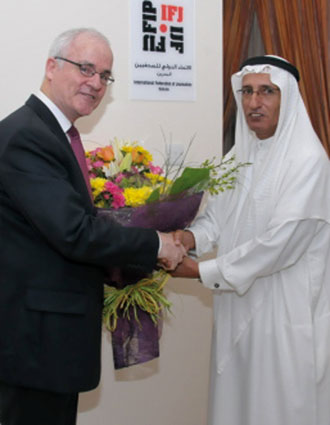
|
 |
 |
|
|
|
|
|
|
|
|
|
|
|
|
|
|
|
|
|
|
|
|
|
|
SG of IFJ, Aidan White:Bahraini Press faces the Challenges
|
 |
White added that the problem in some countries is that they regard the press as their enemy and fight it in many ways. He also noted that in Bahrain the Press Law is still being discussed inside one of the committees in the House of Representatives. White also criticized the Bahraini Government for delaying the passing of the Press Law for a long period of time; pointing to the importance of creating a balanced relationship between the press and the Government.
He added that the challenges which face the press in Bahrain include covering events independently far from politicization for it is well known that newspapers have various political and ideological affiliations.
White reiterated some of the most important challenges facing journalists such as the lack of independent coverage of political events, the affiliation of some newspapers to certain political parties and leaning towards them and the existence of sectarian tendencies. He explained the initiative of the IFJ to promote press ethics that seek to achieve- three objectives: developing media and press principles, initiating dialogue between the press and society, finding a framework that regulates the relationshi? between the press and the authority. He said that these objectives are derived from the following principles: honesty, independence, integrity, humanity and solidarity.
In addition to this, White pointed to six parameters that should be adhered to in this initiative: supporting the rights of all employees working in the media; granting journalists the right to work according to their own conscience; strengthening of reliable self-regulatory systems; building alliances within the media to maintain the quality of the press; encouraging discussion on the future of the press and media; working towards demonstrating the importance of the role of independent press and the va?ues of public service during the formation of media policies at all levels; lifting the restrictions on the freedom of the press; and supporting the right of people to knowledge.
White called upon Bahraini journalists to participate in the media campaign as well as the initiative to promote press ethics. He also did not rule out the interference of influential figures who may wish to hinder the process. According to his experience, newspaper owners are not always after financial gain but also after power and influence. Finally, White demanded that civil society institutions take action and establish institutions to oversee newspaper owners so that they do not distort the truth.